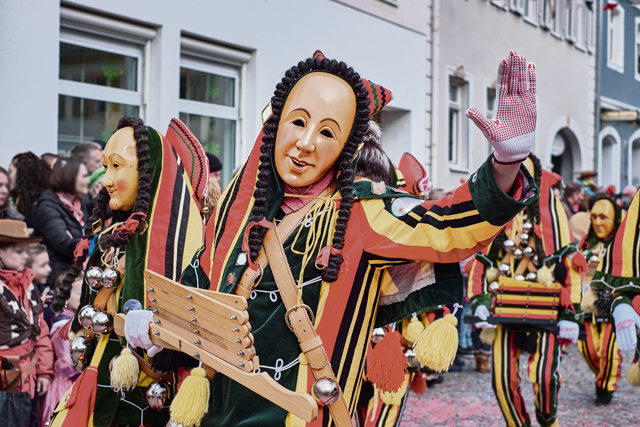Editor’s Note: Although there are no “Carnival” or “Fastnacht” events going on due to the current pandemic, these great festivities will return and now is a good time to learn about the history and customs that make this such a great time of year.

Fasching is a traditional German celebration — also known as Karneval or Fastnacht. It is carnival season, which has been celebrated for centuries by people worldwide who have German heritage. It’s utterly bonkers and terrific fun — get involved!
Fasching can be documented back to pre-Roman times. These times were entirely difficult for the average person and so the carnival season was a chance to be free, enjoy life and have some fun in a world where fun was nonexistent for many. The masks and costumes of today date back to medieval times when they were not in place as fun decorations but as ways to avoid punishment and persecution as carnival goers would mock the strict rulers of the day. Had they not used masks to disguise themselves they would have been caught and death would have been an inevitability.
Fasching is celebrated in all German-speaking countries. It’s timing in the year is poignant as it is just before the fasting season of Lent, which is when many people will forsake food as a sacrifice for religious reasons. Fasching allows a person to have a huge celebration, indulge, enjoy and embrace all that is good before things are out of bounds during Lent.
Germany is the country which holds the largest and most vibrant carnivals to celebrate the Fasching season with every city having it’s own celebrations. The city of Cologne (Köln) probably holds one of the biggest carnival celebrations in the country. Many places of work see this time as a public holiday, though it is not yet officially recognized as one. This means to have the time off, your boss needs to be a fan!
February events:
Altweiber Fastnacht
The ‘Woman’s Carnival’ which happens on the Thursday before Ash Wednesday, also known as Altweiber Fastnacht. This is a day when women can express their freedom and have a lot of fun. Tradition encourages ladies to cut men’s ties and place kisses on those they fancy. It is a flirty, fun event many people look forward to every year — of both genders!
Rosenmontag
Rosenmontag or Rose Monday is what comes next; this is a major highlight for many dancers, marching bands and float parades and the streets filled with entertainment for all. These days the masks mentioned are more extravagant and more modern with the faces of politicians and prolific figures caricaturized upon them. Look out for masks and edifices of German leader, Angela Merkel! You will also be able to find fancy balls and other events that involve dance performances along with a dance floor to try your own luck during intermissions.
Fastnachtdienstag
The celebrations come to an end on Ash Wednesday but prior to this is the much sought-after Shrove Tuesday or Fastnachtdienstag in German. This is another great opportunity to attend one of the costume balls that are held all over Germany. It’s also the day most German school children either have the day off or attend school in a costume (as Americans often do on Halloween).
Carnival costumes for children
Fasching is very much a time where everyone, and especially children, like to dress up in fancy costumes to take part in the fun. You will notice all the German department stores around you will start promoting their fancy dress costumes ready for the parties and parades of Fasching.
Narrenrufe
Narrenrufe is the collective name of the various Carnival greetings that people call out to each other in the street during carnival season. Each city/region/village tends to have its own so its good to learn your local Narrenruf in order to join the fun. Be careful of using the wrong one as people can get very patriotic around that time of year and you will soon become a traitor if you’re shouting Helau in Cologne.
- Kaiserslautern says ‘Kalau!‘
- Wiesbaden and nearby Mainz say ‘Helau!‘ (perhaps one of the most famous ones along with Cologne’s Alaaf!)
- Stuttgart has a different set of traditions involving witches and other scary costumes that were once supposed to scare winter away in order for spring to arrive. ‘Fasnet‘ is celebrated around the same time as Fasching and what one could compare to a Narrenruf there is ‘Narri Narro’
Fasching Parades near your military installation to look for in the future:
Kaiserslautern Area
- Carnival Party in Ramstein Haus des Buergers, Am Neuen Markt 4
- Speckball (Carnival Party) in Bruchmuehlbach-Miesau/Fischbach, Dorfgemein-schaftshaus, Am Weiher 2
- Carnival Party for Children in Bruchmuehlbach-Miesau/Fischbach, Dorfgemeinschaftshaus, Am Weiher 2
- Shrove Monday Procession in Shoenenberg-Kuebelberg
- Shrove Monday Procession in Krottelbach
- Ramstein Carnival Parade in the City Center
Wiesbaden Area
- Kinder Fasching Party and parade, Elsässer Platz
- Fasching Parade, Elsässer Platz
- Rose Monday Parade in Mainz, Domplatz
- Rose Monday Parade in Cologne, Alter Markt
Stuttgart Area
- Kinderfasching, Liederhalle Stuttgart
- Fasnetumzug (Parade), Stuttgart, ends at Karlsplatz


